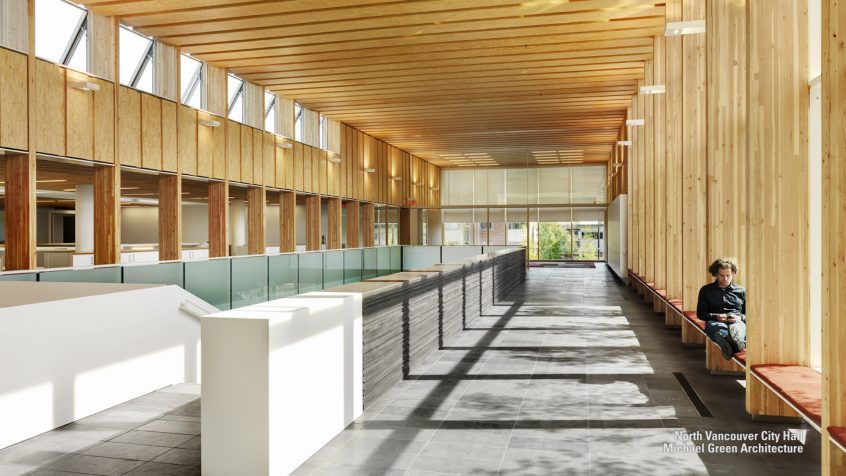A second cross-laminated timber factory has been announced for Eastern Washington in a span of just a few months. The Spokane Valley factory from a California company called Katerra was announced last week, less than four months after Vaagen Brothers announced a new CLT company based in Colville, about 90 minutes north of Spokane Valley.
The new facility in Spokane Valley is strategically located near Eastern Washington forests.
The factory will produce cross-laminated timber and glulam. The engineered products can replace concrete and steel in wooden high-rise buildings and parking garages. They also can be used for other applications, such as walls and flooring.
The environmentally friendly products are made from wood scraps, which are compressed and glued together in layers, forming structural panels and beams.
The products can be made from the small-diameter trees crowding Eastern Washington forests, which foresters are eager to thin to reduce wildfire intensity.
“Spokane is strategic because of the timber resource, the workforce and the location,” said Fritz Wolff, one of Katerra’s co-founders. “It gives us access to the major cities of the Northwest.”
The new plant also brings a high and local pedigree.
(Co-founder Fritz) Wolff, of Spokane, is the chairman of the Wolff Company, started here in 1949 by his grandfather, Alvin J. Wolff. The privately held company is a large developer and operator of apartment complexes across the West.
In 2015, Wolff and two others founded Katerra with the intention of using advanced manufacturing methods to transform the building industry.
“Construction remains one of the most stagnant major industries in the world, still using many of the methods first deployed in the 19th century,” Michael Marks, Katerra’s executive chairman, wrote in a recent piece for a trade publication.
Marks brought a tech manufacturing background to Katerra, including a stint as interim CEO at Tesla, the electric car maker. Jim Davidson, another Katerra co-founder, had worked in technology investment and venture capital.
The Wolff Company became Katerra’s founding client, testing the construction methods in its apartment complexes.
Katerra, which refers to itself as a technology company, has raised more than $200 million since its founding and employs more than 850 people.
“We helped them scale up,” Fritz Wolff said.
Both the Spokane Valley and Colville plants will be huge boosts to the region, according to local economic development leaders.
Todd Mielke, CEO of Greater Spokane Incorporated, said the new manufacturing jobs are an exciting development for the region.
While Katerra is forecasting 150 jobs initially, the plant could grow to 200 or 300 in the future, he said. The company also plans to open a distribution center at some point, which will add another 50 to 75 jobs.
“We couldn’t be more pleased that they’ve chosen the Spokane region,” Mielke said.
Engineered wood products are a natural fit for the region, he said. Washington State University helped develop the local manufacturing method used for cross-laminated timber, and the raw material is abundant, Mielke said.
“It’s an amazing opportunity for the Spokane area to be in the center of this evolving technology,” said Better Spokane’s Cathcart. “It will put a lot of the spindly logs and trees we have in Eastern Washington to good use, utilizing a resource right in our backyard.”
Todd Mielke, CEO of Greater Spokane Incorporated, said the new manufacturing jobs are an exciting development for the region.
While Katerra is forecasting 150 jobs initially, the plant could grow to 200 or 300 in the future, he said. The company also plans to open a distribution center at some point, which will add another 50 to 75 jobs.
“We couldn’t be more pleased that they’ve chosen the Spokane region,” Mielke said.
Engineered wood products are a natural fit for the region, he said. Washington State University helped develop the local manufacturing method used for cross-laminated timber, and the raw material is abundant, Mielke said.
“It’s an amazing opportunity for the Spokane area to be in the center of this evolving technology,” said Better Spokane’s (Michael) Cathcart. “It will put a lot of the spindly logs and trees we have in Eastern Washington to good use, utilizing a resource right in our backyard.”
